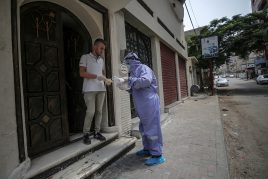
The aid project jointly developed by Caritas Jerusalem (CJ) and the Ministry of Health (MOH) of Gaza, kicked off on January 1 (ongoing until June 30, 2021). CJ is actively operating in five districts of the Gaza Strip (Gaza City, northern Gaza, central Gaza, Khanyounis and Rafah) “to provide emergency home care and assistance to people infected with COVID-19 and other diseases.” The health campaign covers 10,800 direct recipients and 60,480 indirect recipients (family members and relatives), for a total cost of €250,000 that CJ hopes to raise through donors and benefactors. The initiative is all the more important given the challenges facing the Palestinian Authority, as well as Hamas, ruling in the Gaza Strip, in the launch of a vaccination campaign. The Palestinians are trying to secure vaccines from several pharmaceutical companies (AstraZeneca, Johnson & Johnson and Moderna), but especially from COVAX, the global Covid-19 vaccine project co-led by the WHO and Russia, the latter having developed the Sputnik V vaccine. However, for the PLO, Palestine Liberation Organisation, “this effort does not exempt Israel from its responsibility towards the Palestinians. It could take months for the Palestinian Ministry of Health to start the vaccination process. Thus, Israel, being the occupying power, must ensure timely distribution of vaccines to the Palestinian population under occupation without any form of discrimination, and remove all blockades of the Gaza Strip.”
 Caritas’ commitment. The first two COVID-19 cases in Gaza were diagnosed on 21 March, but the spread of the virus was restricted to quarantine centres until early August, when a few cases were diagnosed in the community. As of 12 January, 46,087 cases have been reported and 453 deaths, according to the Palestinian Ministry of Health. “These numbers might seem relatively small,” CJ said, “but owing to a very limited testing capacity ( an estimated 2,000 per day) the real figure is much higher. The same applies to COVID-19 deaths. The overall health condition of the Gaza population is very weak as a result of years of Israeli embargo, growing poverty and malnutrition, unemployment, overcrowding (two million people live in 385 square kilometres in Gaza, ed.). Their hygiene and health conditions are extremely poor, with no drinking water or heating. Many of them – Caritas points out – can’t even afford food supplements to strengthen their depleted immune system.” C.J. has been providing a range of services to the population in the Strip for years, ranging from primary health care to high-quality dental care, from medical care for the elderly and children to health and hygiene education projects. Caritas medical units operate in 15 of the poorest and most marginalised areas of the Strip, many of them near the separation wall. 4,600 families are currently supported with food and hygiene kits. “Family to Family” outreach programmes are also in place for 100 very poor families and the reintegration of unsuccessful asylum seekers.
Caritas’ commitment. The first two COVID-19 cases in Gaza were diagnosed on 21 March, but the spread of the virus was restricted to quarantine centres until early August, when a few cases were diagnosed in the community. As of 12 January, 46,087 cases have been reported and 453 deaths, according to the Palestinian Ministry of Health. “These numbers might seem relatively small,” CJ said, “but owing to a very limited testing capacity ( an estimated 2,000 per day) the real figure is much higher. The same applies to COVID-19 deaths. The overall health condition of the Gaza population is very weak as a result of years of Israeli embargo, growing poverty and malnutrition, unemployment, overcrowding (two million people live in 385 square kilometres in Gaza, ed.). Their hygiene and health conditions are extremely poor, with no drinking water or heating. Many of them – Caritas points out – can’t even afford food supplements to strengthen their depleted immune system.” C.J. has been providing a range of services to the population in the Strip for years, ranging from primary health care to high-quality dental care, from medical care for the elderly and children to health and hygiene education projects. Caritas medical units operate in 15 of the poorest and most marginalised areas of the Strip, many of them near the separation wall. 4,600 families are currently supported with food and hygiene kits. “Family to Family” outreach programmes are also in place for 100 very poor families and the reintegration of unsuccessful asylum seekers.
 Fighting COVID-19. Caritas Jerusalem is offering assistance to infected patients with five mobile medical teams (MMT), coordinated by the Ministry of Health (MoH). In the early stages of the pandemic, the latter had asked Caritas to help prevent the spread of the disease, first in health care facilities and since last summer also in private homes, thereby relieving the pressure on hospitals, already close to collapse. At the beginning of December, however, the MoH requested an additional effort from Caritas Jerusalem: “to employ the five medical teams already operating on site to monitor those who tested positive, measure their oxygen levels, keep them isolated at home, and, if necessary, transfer them to the MoH’s quarantine centres or, in the most severe cases, to hospitals.” Some families of more than 10 people live in a two-bedroom apartment with infected elderly. “In these cases, in conjunction with the MoH, Caritas performs testing on all occupants and, if necessary, transfers the infected to another location. Caritas has also created a dedicated contact centre hotline to respond to requests of information on COVID-19 infection. At the same time, CJ is also engaged in the training of its healthcare staff, including providing them with appropriate protection equipment, a reason why none of its workers have so far contracted the virus.
Fighting COVID-19. Caritas Jerusalem is offering assistance to infected patients with five mobile medical teams (MMT), coordinated by the Ministry of Health (MoH). In the early stages of the pandemic, the latter had asked Caritas to help prevent the spread of the disease, first in health care facilities and since last summer also in private homes, thereby relieving the pressure on hospitals, already close to collapse. At the beginning of December, however, the MoH requested an additional effort from Caritas Jerusalem: “to employ the five medical teams already operating on site to monitor those who tested positive, measure their oxygen levels, keep them isolated at home, and, if necessary, transfer them to the MoH’s quarantine centres or, in the most severe cases, to hospitals.” Some families of more than 10 people live in a two-bedroom apartment with infected elderly. “In these cases, in conjunction with the MoH, Caritas performs testing on all occupants and, if necessary, transfers the infected to another location. Caritas has also created a dedicated contact centre hotline to respond to requests of information on COVID-19 infection. At the same time, CJ is also engaged in the training of its healthcare staff, including providing them with appropriate protection equipment, a reason why none of its workers have so far contracted the virus.
 The help of the Church. CJ efforts are accompanied by those of the Church, demonstrated by Pope Francis’ donation of 2500 COVID-19 testing kits to the MoH last June through the Congregation for the Oriental Churches. The kits were delivered by Caritas Jerusalem and Father Gabriel Romanelli, Latin parish priest of the Holy Family church in Gaza, under the coordination of the Apostolic Delegation, the Latin Patriarchate of Jerusalem. The kits formed part of allocations from the new Emergency Fund for the Oriental Churches created by the Vatican for the coronavirus emergency.
The help of the Church. CJ efforts are accompanied by those of the Church, demonstrated by Pope Francis’ donation of 2500 COVID-19 testing kits to the MoH last June through the Congregation for the Oriental Churches. The kits were delivered by Caritas Jerusalem and Father Gabriel Romanelli, Latin parish priest of the Holy Family church in Gaza, under the coordination of the Apostolic Delegation, the Latin Patriarchate of Jerusalem. The kits formed part of allocations from the new Emergency Fund for the Oriental Churches created by the Vatican for the coronavirus emergency.












